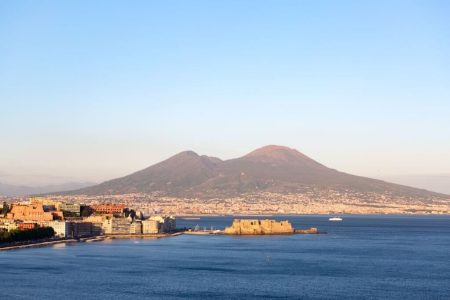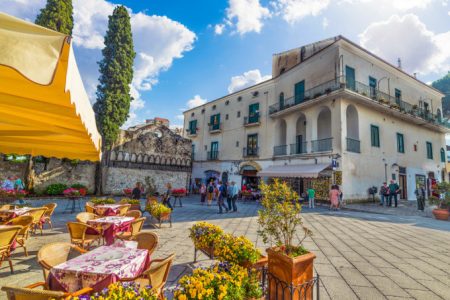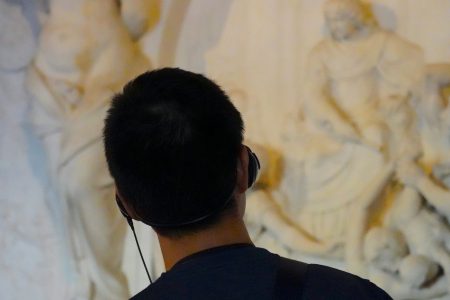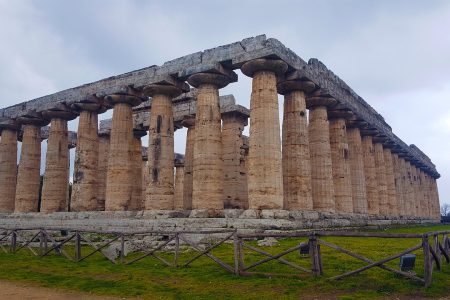Table of Contents
February is one of the best times to visit Campania. Temperatures are generally mild, tourist influx is low, and this allows you to enjoy the region's main cultural and scenic sites with greater peace of mind. It is the ideal time to organize itineraries among archaeology, art, nature and historic villages, taking advantage of organized tours and convenient train or bus connections.
The Archaeological Excavations of Pompeii
The Ruins of Pompeii represent some of the most important archaeological evidence in the world. The Roman city, buried by the eruption of Vesuvius in 79 A.D., preserves streets, dwellings, temples, theaters and stores that tell the story of daily life at the time in extraordinary detail. Visiting Pompeii in winter allows you to tour the archaeological area without the intense heat and without the long lines typical of the high season.
In addition to the excavations, it is possible to visit the modern center of Pompeii, with the Shrine of the Blessed Virgin of the Rosary, or combine the experience with an excursion to Mount Vesuvius or the discovery of nearby archaeological sites.
Among the options available on Movery to visit the Pompeii Ruins, you can choose different solutions according to your needs. The Shared guided tour of the Pompeii excavations with skip-the-line ticket Is ideal for those who want a full tour of about two hours with priority access.
For those staying on the Coast or in Salerno, the Pompeii tour from Salerno with transportation, admission and guide, which includes organized transfer, ticket and professional accompaniment.
Alternatively, the Priority entrance ticket with expert tour guide Provides a practical solution for quick access to the site and deepening the visit with a licensed guide.
The Archaeological Excavations of Herculaneum
A few kilometers from Pompeii are the Herculaneum excavations, also related to the eruption of 79 AD. Compared to Pompeii, Herculaneum is more collected but has an exceptional state of preservation, with multi-story buildings, mosaics and wooden structures still visible.
The visit can be enriched with the MAV - Virtual Archaeological Museum and a route along the Golden Mile, where elegant 18th-century Vesuvian villas are located.
Pompeii and Herculaneum can also be visited on the same day thanks to train and bus connections from Naples and Salerno.
The Royal Palace of Caserta and historic villages
The Royal Palace of Caserta is one of the grandest monumental complexes in Europe, declared a UNESCO World Heritage Site. Built in the 18th century at the behest of the Bourbons, it is often referred to as the "Italian Versailles" because of the majesty of the Royal Apartments and the impressive Royal Park with scenic fountains and the famous English Garden.
Visiting the Reggia in February allows you to calmly admire the interiors, monumental staircase and historical collections without the heavy spring rush.
Around Caserta it is possible to enrich the itinerary with some of the most interesting historical and natural attractions in the area. The medieval village of Casertavecchia retains the charm of the past with its Romanesque cathedral, narrow stone streets and panoramic views of the surrounding area.
The Monumental Complex of the Belvedere of San Leucio represents a unique example of Bourbon industrial architecture, with historic buildings, weaving mills and craft production facilities set in a monumental context.
For nature lovers, the Mount Tifata offers hiking trails surrounded by greenery, with scenic trails that allow you to view Caserta and its surroundings from spectacular perspectives.
You might be interested
Excursion to Pompeii excavations with ticket included and departure from Ischia, with free stop in Naples
per person Book
Excursion by minivan to Amalfi and Ravello departing from Salerno
per person Book
Shared guided tour of the Pompeii excavations with skip-the-line ticket included - Departure from Pompeii
per person Book
Visit Vesuvius: complete package with bus, audio guide and entrance fee
per person Book
Tour of the Royal Palace of Caserta by train from Naples: with or without audio guide
per person Book
Visit to the Paestum excavations with train departure from Naples and entrance fee
per person Book
Full day shared minivan tour between Positano and the Amalfi Coast departing from Sorrento
per person Book
Day by minivan to visit Sorrento and the Amalfi Coast departing from Naples
per person Book
The Amalfi Coast and Salerno in winter
For those who wish to discover the beauty of the Amalfi Coast in total comfort, Movery offers several solutions with minivan and professional driver. The Full day shared minivan tour between Positano and the Amalfi Coast departing from Sorrento allows you to visit Positano, Amalfi and Ravello with dedicated stops, taking advantage of a comfortable vehicle and chauffeur service throughout the day.
Alternatively, for those departing from Naples, the Day by minivan to visit Sorrento and the Amalfi Coast, with round-trip transfer and stops in Sorrento, Positano, Amalfi and Ravello, ideal for experiencing a complete excursion without logistical worries.
Among the highlights of the Amalfi Coast are iconic villages such as. Amalfi, with the historic center and St. Andrew's Cathedral; Ravello, famous for Villa Rufolo and Villa Cimbrone with their gardens and spectacular views; and Positano, with its stepped pastel-colored houses by the sea, quaint streets and picturesque beaches, one of the most photographed destinations on the coast.
The visit can be arranged in one day or combined with a longer stay to explore even scenic trails and small, lesser-known villages.
Another recommended experience, especially if you are staying in the Salerno or Amalfi Coast area, is the Sorrento chauffeured tours departing from Salerno. This service provides a comfortable and carefree transfer along the coast, allowing you to reach Sorrento by car with a professional driver, avoiding traffic and complications related to parking or public transportation. Once in Sorrento, you can spend time exploring the historic center, squares and local boutiques, or use it as a base for excursions to the Sorrento Peninsula, Capri or Positano.
What you can visit beyond the main stops
In addition to Pompeii, Herculaneum and Caserta, Campania offers additional cultural and scenic experiences:
- Naples and its historic center UNESCO heritage site
- The National Archaeological Museum in Naples
- Sorrento and the Sorrento Peninsula
- Paestum with Greek temples
- Vesuvius National Park
How to reach the main tourist sites from Garibaldi Square
To reach the main tourist sites in Campania from Garibaldi Square, the transportation center of Naples, you can use convenient and frequent trains and buses. The Pompeii excavations are easily reached by the train of the Circumvesuviana in the direction of Sorrento: the stop Pompeii Ruins - Villa of the Mysteries is located within walking distance of the main entrance to the archaeological site. For the Excavations of Herculaneum, again with the Circumvesuviana, take the Naples-Sorrento line to the station Herculaneum Excavations, only 200 meters from the main entrances. La Royal Palace of Caserta can be reached from Naples Central station (adjacent to Piazza Garibaldi) by regional trains on the Naples-Caserta, which lead directly to the station of Caserta, from which a short walk or local bus ride leads to the entrance of the Palace.









0 Comments